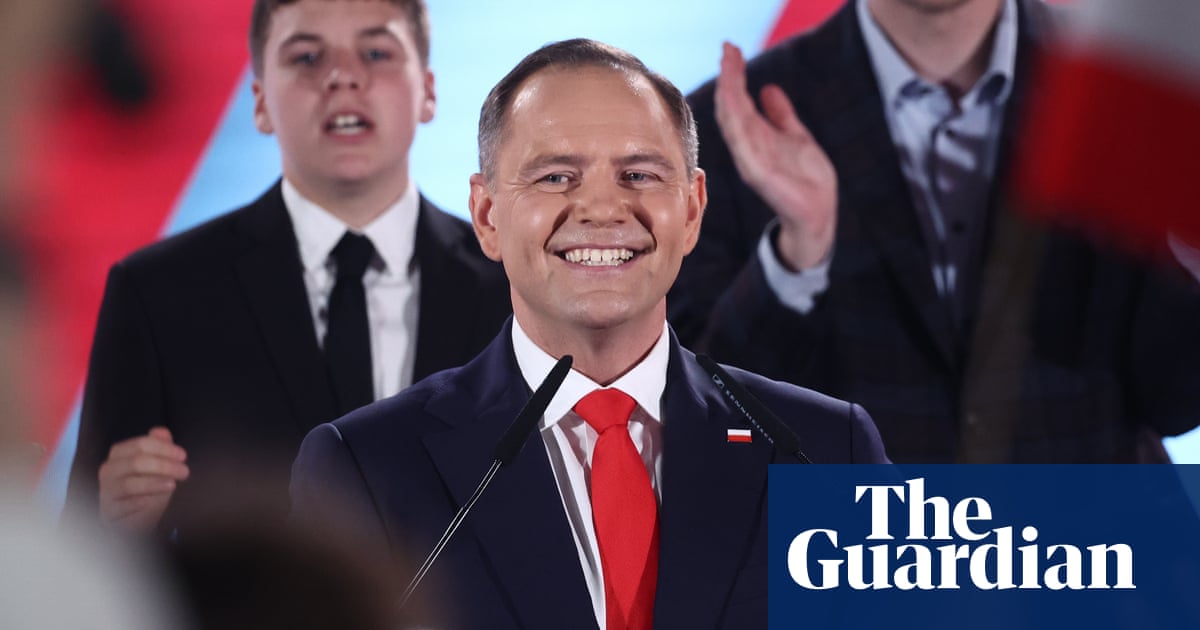The victory margin of the nationalist Karol Nawrocki in Poland’s presidential elections may have been wafer-thin, but it marks a huge upheaval in the country’s political landscape whose impact will be felt not just in Warsaw but across the EU.
Backed by the previous ruling conservative Law & Justice (PiS) party and, openly, by Donald Trump’s Maga movement, Nawrocki, a radical-right historian, defeated his liberal rival, the capital’s mayor, Rafał Trzaskowski,by 50.89% to 49.11%.
His win means PiS retains a size-11 boot in the door of Poland’s politics that could seriously destabilise the coalition government of the centre-right prime minister,Donald Tusk, and threaten the country’s newfound place at Europe’s top table.
Tusk’s election in 2023 brought to an end eight years of PiS rule and signalled Poland’s return to the European fold. Over the past two years, the bloc’s sixth-biggest economy has become a key player at the heart of mainstream European policymaking.
Nawrocki’s victory hands him a presidential veto that will make it difficult for Tusk’s government to pass promised legislation rolling back the judicial and other changes implemented by PiS that led to repeated clashes with Brussels.
But it heralds more than just a delicate period of cohabitation between a pro-EU prime minister and a nationalist, Eurosceptic president. The 42-year-old, who has never held elected office, will seek to actively undermine Tusk wherever he can.
Poland’s outgoing PiS-aligned president, Andrzej Duda, deployed his veto, but sparingly. Nawrocki will do so more aggressively and systematically, analysts say, aiming to weaken the prime minister before 2027 parliamentary elections.
PiS and its allies will portray Sunday’s presidential vote as a full-scale rejection of Tusk’s progressive and reformist agenda – and may even be tempted to try to bring down his already fractured coalition government before the end of its term.
Snap elections could be triggered, for example, if Nawrocki, whose campaign focused on conservative Catholic values, attacks on EU migration and climate policy and opposition to Ukraine’s accession to the bloc, decides to stall the budget, which he could do by sending it to the PiS-dominated constitutional tribunal.
Polls suggest that PiS and the far-right, libertarian Confederation party of Sławomir Mentzen, who won nearly 15% of the vote in the first round of the presidential ballot, could control a majority of seats in parliament if they were to unite.
So far, Mentzen has ruled that out, even refusing to endorse Nawrocki. But an analysis of Sunday’s vote showed that almost 90% of Mentzen’s first-round voters backed Nawrocki in the presidential runoff, and the potential affinity is clear.
In Europe, while Tusk will continue to represent Poland at EU summits, he will inevitably be weakened by the challange to his domestic legitimacy. Nawrocki, as commander-in-chief, may also seek to sway Poland’s strongly pro-Ukraine stance.
Sign up toThis is Europe
The most pressing stories and debates for Europeans – from identity to economics to the environment
after newsletter promotion
He has not shied away from tapping into Polish anti-Ukrainian sentiment over refugees, has criticised Kyiv and its EU and Nato accession plans, and his attendance at Nato summits could significantly complicate Europe’s united pro-Ukraine front.
Nawrocki will have somewhat less influence over other EU issues to which he is also opposed, such as deeper integration, joint borrowing and Europe’s green deal, but the overall effect of his election on Poland’s pro-EU ambitions will be chilling.
The European Commission president, Ursula von der Leyen, said on Monday the EU would continue its “very good cooperation” with Poland. But analysts note Polish conservatives cast Sunday’s vote as a refendum on Tusk’s whole pro-EU agenda.
The nationalist’s win is also a boost for Europe’s populist EU-critical parties, led by Italy’s prime minister, Giorgia Meloni, and to Viktor Orbán, Hungary’s prime minister and the bloc’s disrupter-in-chief, whose illiberal rule-of-law playbook PiS follows.
Nawrocki’s triumph was a “fresh victory for patriots”, Hungary’s foreign minister, Péter Szijjártó, said on his Facebook page on Monday.
Nawrocki, who was invited to Washington by Trump and has shared a selfie with the US president, is opposed to Europe’s recent security shift away from the US and favours closer transatlantic ties – another source of tension with Tusk, and Brussels.
